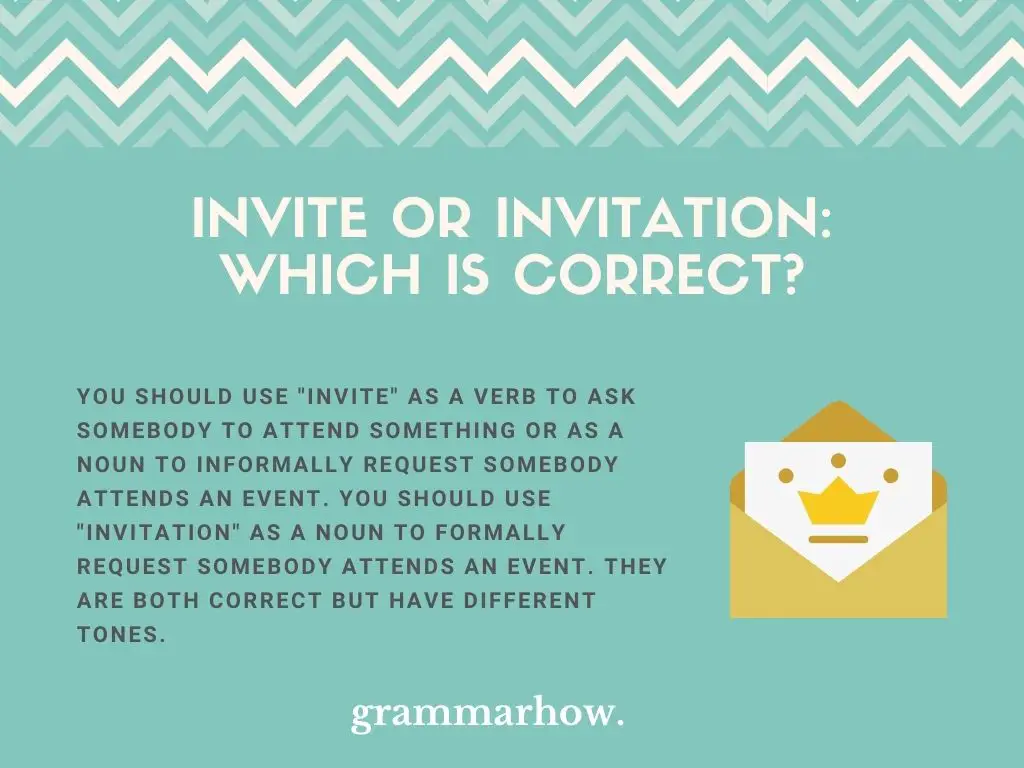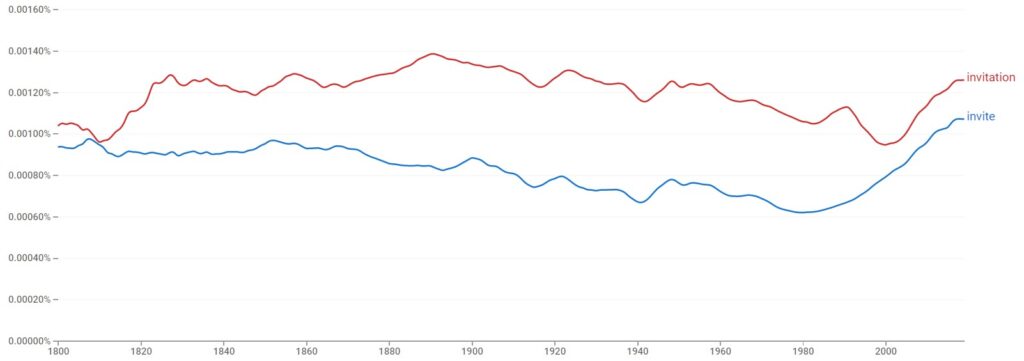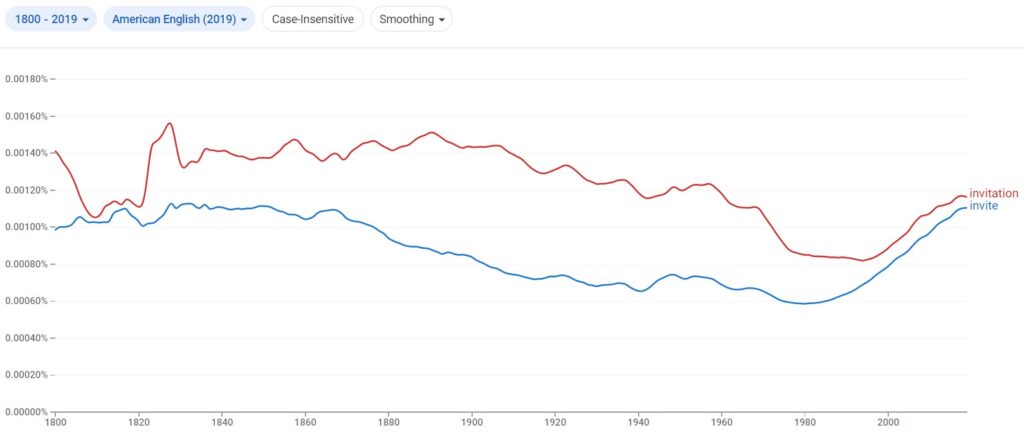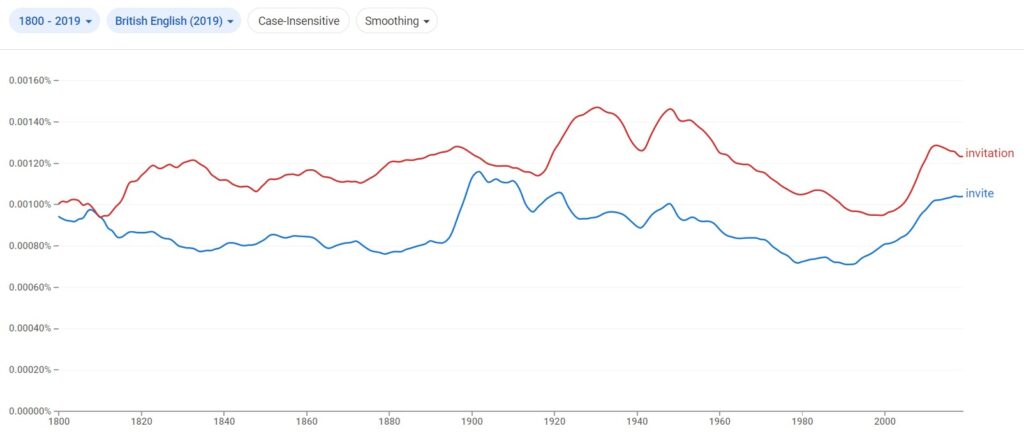The words “invite” and “invitation” are very similar. They both come from the root word “invite” and mean sending something to someone. This article will look at the direct differences between the two and how best to use them.
Invite Or Invitation: Which Is Correct?
You should use “invite” as a verb to ask somebody to attend something or as a noun to informally request somebody attends an event. You should use “invitation” as a noun to formally request somebody attends an event. They are both correct but have different tones.

The definition of “invite,” according to The Cambridge Dictionary, is “to ask or request someone to go to an event.” It’s more common to see it used like this in the verb form. In the noun form, it’s interchangeable with “invitation.”
The definition of “invitation,” according to The Cambridge Dictionary, is “the act of inviting someone to go to an event.” “Invitation” requires someone to “invite” you to an event.
The two words both mean the same thing; it mostly depends on the form you use. Generally speaking, you’ll find “invitation” in more formal cases, and “invite” in more informal ones.
Is “Invite “Or “Invitation” Used The Most?
So, which of the two phrases is more popular? We often find that when we look at the statistics for words like this, we’ll see a sizeable difference between the two. That usually helps us to determine which one we should focus on learning more about.
According to Google, “invite” is mentioned 42,000 times on The New York Times website, while “invitation” is mentioned 51,200 times. The difference in usage here isn’t very clear, which shows how similar the words are.
Native speakers don’t often pay attention to the difference, especially not in spoken English. In written English, it’s usually more common to write “invitation” if you’re presenting a formal event; otherwise, you can use them interchangeably.
According to this graph, we can see that both “invitation” and “invite” are almost identical in usage. Of course, this graph is probably looking at “invitation” as a noun and “invite” as a verb, but it shows just how similar they both are.

In the case of using them both as a noun, you’ll usually find them about equal, depending on the writing tone. Many people wouldn’t mind receiving a “wedding invitation” or a “wedding invite.” They’re both synonymous with each other, which is handy when learning about them.
Is “Invite” And “Invitation” Used Differently In American English And British English?
We can go further with the statistics to see if there’s much difference between American and British English. Usually, American English will sway towards the more informal saying in these cases, while British English will move towards the formal one.
However, the difference between “invite” and “invitation” doesn’t seem to be as apparent in either of the languages.
According to this graph, both words are used almost identically in American English. “Invitation” is slightly more popular, but the difference is negligible.

According to this graph, we can say the same about British English. “Invitation” is slightly more popular, but there isn’t that much difference between either.

In spoken English, the differences become slightly more apparent.
American English uses “invite” more as a noun, while British English uses “invitation” as the noun. You can find both words in both languages; it mainly depends on the tone of writing as to which one you will use.
Spoken English rules are usually more relaxed than written English rules, which is probably why there isn’t much difference between them in the two graphs we shared (since those graphs only cover the differences in written English).
Also, the graphs don’t identify the differences between “invite” as a noun and a verb, so it’s likely they’re grouped, while “invitation” is only ever used as a verb.
If I Am Not From The US Or The UK, Should I Use “Invite” Or “Invitation”?
If you’re not from either the US or the UK, you might be a little confused about which language you should use. Luckily, it’s not that complicated when it comes to remembering the differences between “invite” and “invitation.”
Non-English-speaking countries tend to use British English as their main language. That means that both words work. “Invite” is best in informal situations, while “invitation” works better in formal cases.
Because the words are synonymous, it makes it much easier for non-English-speaking countries to use them. Usually, you’d have to decide between British or American English rules, but they seem to be the same thing in this case.
Can “Invite” And “Invitation” Be Used Interchangeably?
As we’ve previously mentioned, the most common way you’ll see either of these words written is in the interchangeable sense. They have identical meanings, which shows you can use them both in the same way.
“Invite” and “invitation” are interchangeable. The only time you’ll ever need to think about which one to use comes down to which tone you want to write with.
- Informal:Invite
- Formal:Invitation
To help you make sense of this better, we encourage you to use both “invite” and “invitation” in an informal tone. It doesn’t matter which one you use because no native speaker will tell you that you’re wrong (since they’re both correct).
In a formal tone, they’re not interchangeable. You should only use “invitation” and never confuse it with “invite.”
If you can remember those two rules, you’ll have no problems with these words.
Examples Of How To Use “Invite” In A Sentence
Let’s go over some examples of them both in sentences. We’ll start with the informal one, “invite.” We’ll include it in both the verb form and the noun form so you can see when you should use them.
Verb
- I’d like to invite you to my party.
- We’re inviting you to our wedding.
- You’re invited!
- He’s not invited to my event!
Noun
- I’ve got your wedding invite in the mail!
- You’ve just received an invite to the council event.
- We’ve got an invite in the mail for something we’ve never heard of.
- I think it’s time to send out the invites.
Examples Of How To Use “Invitation” In A Sentence
Now let’s go over using “invitation” in a sentence. This is only ever used as a noun, so we don’t have to worry about the verb form here. It’s also more appropriate to see this in formal situations, so pay attention to the tone of the following examples.
- These are the wedding invitations they’ve asked us to look through.
- You’ve got a meeting invitation in your emails.
- I haven’t received an invitation.
- Are there any more invitations we need to send out?
- My boss has given me an invitation to attend a disciplinary hearing.
Is There Any Difference Between “Invite To” And “Invite For”?
When used in the verb form, “invite” is often followed by a preposition like “to” or “for.” Prepositions have a habit of changing the meanings of words, so we thought we’d explain the differences between these two.
You should use “invite to” when you’re inviting somebody to an event or a venue. You should use “invite for” when you’re inviting somebody to take part in an activity with you.
- I’m inviting you to join me at the party.
- Where’s my invite for dinner?
Is “Invite” Informal?
“Invite” is informal compared to “invitation.” Recently, it has begun to pick up popularity as a noun rather than a verb. It’s common for people to use it synonymously with “Invitation,” though it’s the more informal choice of the two.
Is It Invite Or Invites You?
“Invite” is used when we want to talk about it in the noun form. It means we’re presenting somebody with something (a physical item or our word) to ask them to join us in something. “Invites you” is the verb form we use when doing the action of inviting somebody.
- This is an invite to my party. (Noun form)
- He invites you to the party. (Verb form)
Is It Thank You For The Invite Or Invitation?
“Thank you for the invite” is best in informal situations, or when the person sent you an “invite” that was specified. “Thank you for the invitation” is best in formal situations, or when the “invitation” specifically includes the word “invitation” on it.
Do You Say Meeting Invite Or Meeting Invitation?
A “meeting invitation” is almost always the form you’ll come across. Generally, a “meeting” is a formal occurrence at the workplace or somewhere similar. “Invitation” is the formal noun that should accompany it at all times.
Is It “A Invitation” Or “An Invitation”?
“An invitation” is the correct spelling. “An” is a determiner that must be used before words that start with a vowel (a, e, i, o, u) or before words that sound like they start with a vowel (hour, honor).
Using “a” as the determiner only works for words that start with a hard consonant sound. So “a invitation” is always incorrect. This rule applies to every other part of English, so it’s important to learn it as soon as possible.

Martin holds a Master’s degree in Finance and International Business. He has six years of experience in professional communication with clients, executives, and colleagues. Furthermore, he has teaching experience from Aarhus University. Martin has been featured as an expert in communication and teaching on Forbes and Shopify. Read more about Martin here.
